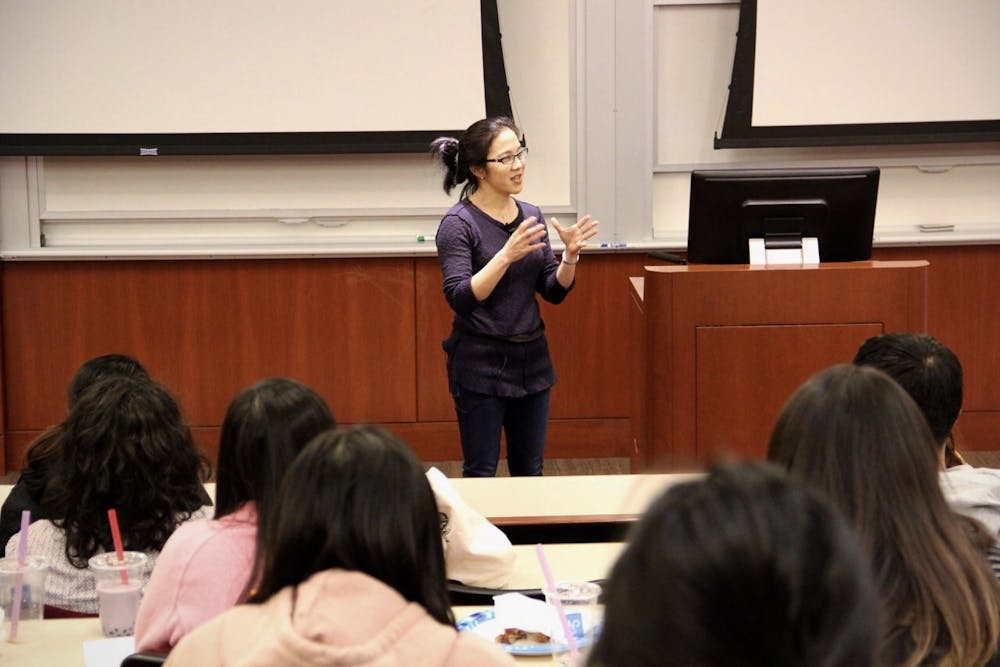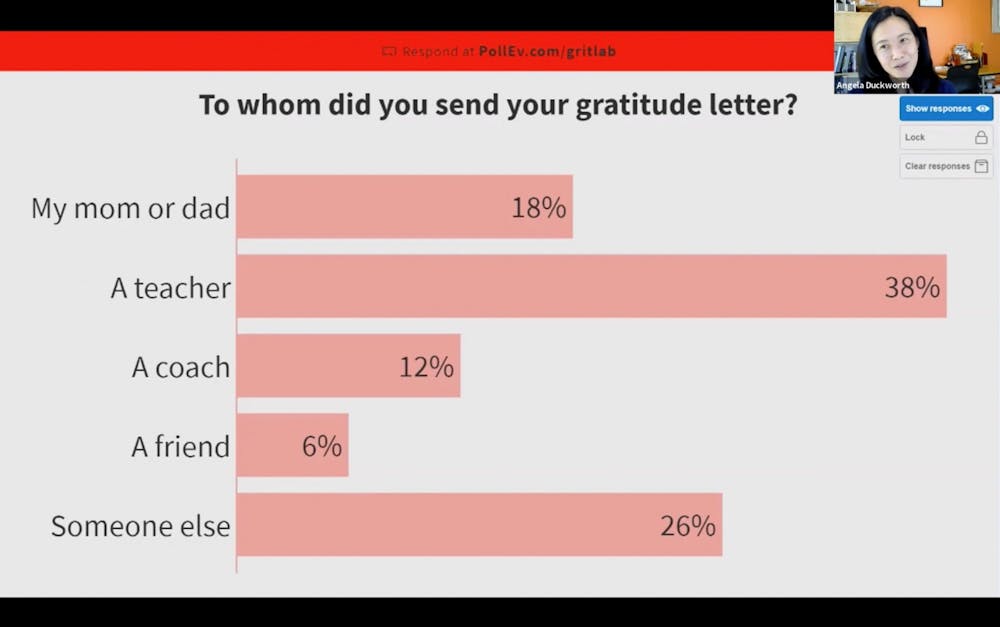
Last spring, renowned Psychology professor and New York Times bestselling author Angela Duckworth began teaching a course unlike any other at Penn: enrolling 60 students across the four undergraduate schools graded on a mandatory pass-fail basis and featuring weekly alumni guest speakers.
The course, PSYC 005 Grit Lab: Fostering Passion and Perseverance, focuses on providing students skills to accomplish long-term goals and is divided into two halves — one that centers on finding a passion and the other on cultivating the skill of perseverance. Students participated in structured "experiments" outside of class, maintained a journal for reflection, and created a presentation to document what they learned about grit.
Though the COVID-19 pandemic forced the second half of the course to be conducted remotely, students and Duckworth herself deemed Grit Lab to be an overwhelming success. Duckworth said the course received high ratings from students and said that she and Grit Lab's four TAs discovered an increase in students' self-reported passion and perseverance traits from the beginning to the end of the course.
Grit Lab will run for a second consecutive semester this fall.
Rising College junior Lana Prieur was already familiar with the concept of grit through the University Scholars program which offers students increased undergraduate research opportunities. Though Prieur had already been apart of research on the concept of grit, she found that what she took from the class applied to much more than just her career choice.
“[We discussed] things like how to compose an email, how to have mini-interviews with people that [Angela] called 'curiosity conversations,' how to practice effectively, how to express your gratitude,” Prieur said.

Prieur said her classes at Penn have typically been large lectures where students work individually, but said that in Grit Lab, students were not only encouraged to work together but were required to do so. On the first day of class, students were divided into four cohorts where they gave each other frequent feedback, thus creating a strong sense of community, Prieur said.
“I think that kind of environment has really made me a lot more open, which I think is a great support structure,” Priuer said.
Duckworth said she tried to create a supportive environment while also being demanding enough, a combination she has found crucial to encouraging positive behavior in her research on grit and perseverance.
"[Mentors] ask you to do what you can't yet do, but [are] also really supportive that you never doubt their intentions, you trust them, and you know they have your best interests in mind," Duckworth said.
Grit Lab was graded solely on a pass-fail scale and students' grades were based on their levels of "demonstrated engagement." Homework assignments focused on identifying one's strengths and values and on growing as an individual, rising Engineering and Wharton junior Orestis Skoutellas, who was enrolled in the course last spring, said.
For Skoutellas, one reason Grit Lab was a success is because he found that many students took the course out of genuine investment in their own self-discovery, rather than out of motivation to take the class solely for course credit.
In one of the homework exercises, students were required to research three possible professions: the career they are currently working towards, their secondary career choice, and the career they would choose if success were guaranteed. For rising Wharton sophomore Joyce Guo, the exercise encouraged her to consider becoming a teacher.
“At Penn there is a pre-professional vibe, which there is nothing inherently wrong with, but I think that sometimes that pressure can be a really loud voice,” Guo said. “So I think [the exercise] helped me try to discern my voice through it all too.”
Rising Wharton sophomore Jessica Reidman explained an important lesson from the course was to create goal hierarchies — or clear vision of what your long-term goal in life is — and how to accomplish that goal by completing a series of smaller, more time-sensitive tasks.
“I think a lot of people at Penn naturally gravitate towards doing what the hardest thing they can do is, and that’s how we try to achieve or try to stand out at a high level,” Reidman said. “But this class really took us back to thinking how many of us are doing something that we want to sustain for a lifetime.”
The course also featured live interviews with Penn alumni, named 'Grit Guests,' who have displayed grit in their career. Each of the guests were asked to share their own long-term goals and treated five students to dinner following the class period.
Riedman attended dinner with 2018 College graduates Ahmad Jones, Khalil Jones, and Malik Jones, joint founders of fitness company Triyo Fitness, and 2017 College graduate Sophie Beren, the founder of The Conversationalist, a platform that encourages young people to have [difficult] conversations that celebrate all perspectives and promote change.

When on-campus classes shifted online at the end of spring break in mid-March, Duckworth modified Grit Lab to be more virtually engaging. Instead of a weekly three hour lecture, students participated in a synchronous, two-hour online lecture with activities that allowed them to interact with each other through the screen.
At the end of each class, students were able to share their thoughts on how the class went, and how the class could improve, which Duckworth said was an essential part of consistently improving Grit Lab.
“One of the basic things about human learning is that you really can’t learn anything without feedback,” Duckworth said. “We learned about that in the class, but I also wanted to model everything we were learning.”
In the future, Duckworth said she hopes to make the class more rigorous, with an increased focus on academic literature and comprehension of the material through self-timed quizzes. She also said students from the first Grit Lab class may be invited back as 'Grit Guests' in the future.
Grit Lab will be conducted entirely online in the upcoming semester, Duckworth said. Students who have already been selected for the fall 2020 class have the opportunity to defer and take the course in fall 2021.
For Duckworth, Grit Lab is a way to bring her research on grit into the classroom while giving students the opportunity to grow.
“I think that teaching is helping me become a better scientist because every week there’s data and feedback on what’s working and not working,” Duckworth said. “I’m not thinking of Grit Lab as a separate thing from my scientific research, but more like a part of the same overall endeavor.”
Duckworth's research focuses on non-cognitive predictors of achievement, the impact of self-control on academic achievement, and, most famously, grit, which describes character traits such as self-control and perseverance that enable success.
Reidman believes one of the most important takeaways from Grit Lab is believing in the importance of not only passion, but of purpose as well.
“What is something that I can give that creates value for others?” Reidman said. “It’s very satisfying to feel like you have this purpose beyond yourself that will sustain you for more than having something that’s pleasurable for you in the moment.”
For Prieur, the most vital lesson from the class is learning to build a strong support system.
“I don’t think anyone can take on life alone,” Prieur said. “It doesn’t really matter how passionate you are at something, or how much you think you preserve at something, you definitely need someone else to be there for you to help you get where you need to go.”
Duckworth said she is completely invested in improving the class, as she believes it is important to have a course at Penn that models motivation and resilience for students — especially those planning to navigate a career after graduating from college.
“It’s going to take everyone a lot of time and experience to find their way, but maybe this [course] can accelerate the development of the mindset and skillsets that it took quite a while for me to develop on my own,” Duckworth said.
The Daily Pennsylvanian is an independent, student-run newspaper. Please consider making a donation to support the coverage that shapes the University. Your generosity ensures a future of strong journalism at Penn.
Donate







